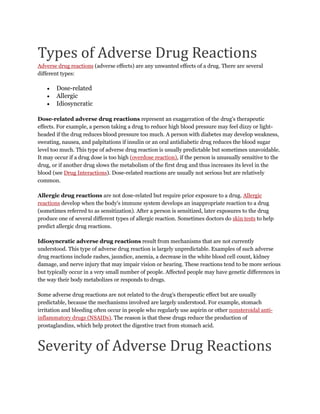Adverse drug reaction types
There are several types of adverse drug reactions: - Dose-related reactions occur when a drug's effects are exaggerated due to too high of a dose or other drug interactions. These are usually predictable but sometimes unavoidable. - Allergic reactions require prior exposure to a drug and occur through an inappropriate immune response. - Idiosyncratic reactions have unknown mechanisms and are largely unpredictable, ranging from mild to serious. Adverse reactions are described as mild, moderate, severe, or lethal depending on their significance and consequences. Mild reactions like headaches or nausea usually do not require stopping treatment but may require dose changes. Moderate reactions such as rashes or mood changes warrant reevaluation. Severe reactions are

Recommended
Recommended
More Related Content
Similar to Adverse drug reaction types
Similar to Adverse drug reaction types (20)
More from Rajesh Yadav
More from Rajesh Yadav (18)
Recently uploaded
Recently uploaded (20)
Adverse drug reaction types
- 1. Types of Adverse Drug Reactions Adverse drug reactions (adverse effects) are any unwanted effects of a drug. There are several different types: Dose-related Allergic Idiosyncratic Dose-related adverse drug reactions represent an exaggeration of the drug's therapeutic effects. For example, a person taking a drug to reduce high blood pressure may feel dizzy or light- headed if the drug reduces blood pressure too much. A person with diabetes may develop weakness, sweating, nausea, and palpitations if insulin or an oral antidiabetic drug reduces the blood sugar level too much. This type of adverse drug reaction is usually predictable but sometimes unavoidable. It may occur if a drug dose is too high (overdose reaction), if the person is unusually sensitive to the drug, or if another drug slows the metabolism of the first drug and thus increases its level in the blood (see Drug Interactions). Dose-related reactions are usually not serious but are relatively common. Allergic drug reactions are not dose-related but require prior exposure to a drug. Allergic reactions develop when the body's immune system develops an inappropriate reaction to a drug (sometimes referred to as sensitization). After a person is sensitized, later exposures to the drug produce one of several different types of allergic reaction. Sometimes doctors do skin tests to help predict allergic drug reactions. Idiosyncratic adverse drug reactions result from mechanisms that are not currently understood. This type of adverse drug reaction is largely unpredictable. Examples of such adverse drug reactions include rashes, jaundice, anemia, a decrease in the white blood cell count, kidney damage, and nerve injury that may impair vision or hearing. These reactions tend to be more serious but typically occur in a very small number of people. Affected people may have genetic differences in the way their body metabolizes or responds to drugs. Some adverse drug reactions are not related to the drug's therapeutic effect but are usually predictable, because the mechanisms involved are largely understood. For example, stomach irritation and bleeding often occur in people who regularly use aspirin or other nonsteroidal anti- inflammatory drugs (NSAIDs). The reason is that these drugs reduce the production of prostaglandins, which help protect the digestive tract from stomach acid. Severity of Adverse Drug Reactions
- 2. Adverse drug reactions (adverse effects) are any unwanted effects of a drug. There is no universal scale for describing or measuring the severity of an adverse drug reaction. Assessment is largely subjective. Reactions can be described as Mild Moderate Severe Lethal (deadly) Mild or moderate adverse drug reactions do not necessarily mean that people must stop taking a drug, especially if no suitable alternative is available. However, doctors are likely to reevaluate the dose, frequency of use (number of doses a day), and timing of doses (for example, before or after meals; in the morning or at bedtime). Other drugs may be used to control the adverse drug reaction (for example, a stool softener to relieve constipation). Mild adverse drug reactions Mild reactions usually described as of minor significance include Digestive disturbances (such as nausea, constipation, diarrhea) Headaches Fatigue Vague muscle aches Malaise (a general feeling of illness or discomfort) Changes in sleep patterns However, such reactions can be very distressing to people who experience them. As a result, people may be less willing to take their drug as instructed, and the goals of treatment may not be achieved. Moderate adverse drug reactions Moderate reactions include Rashes (especially if they are extensive and persistent) Visual disturbances (especially in people who wear corrective lenses) Muscle tremor Difficulty with urination (a common effect of many drugs in older men) Any perceptible change in mood or mental function Certain changes in blood components, such as a temporary, reversible decrease in the white blood cell count or in blood levels of some substances, such as glucose Also, reactions that are usually described as mild are considered moderate if the person experiencing them considers them distinctly annoying, distressing, or intolerable.
- 3. Severe adverse drug reactions Severe reactions include those that may be life threatening (such as liver failure, abnormal heart rhythms, certain types of allergic reactions), that result in persistent or significant disability or hospitalization, and that cause a birth defect. Severe reactions are relatively rare. People who develop a severe reaction usually must stop using the drug and must be treated. However, doctors must sometimes continue giving high-risk drugs (for example, chemotherapy to people with cancer or immunosuppressants to people undergoing organ transplantation). Doctors use every possible means to control a severe adverse drug reaction. Lethal adverse drug reactions Lethal reactions are those in which a drug reaction directly or indirectly caused death. These reactions are typically severe reactions that were not detected in time or did not respond to treatment. Lethal reactions can be the reasons that some drugs are withdrawn from the market (such as troglitazone and terfenadine).